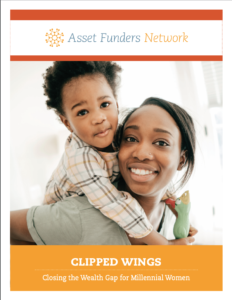 Clipped Wings: Closing The Wealth Gap for Millennial Women
Clipped Wings: Closing The Wealth Gap for Millennial Women
Asset Funders Network
First published March 2019
Our new report reveals the current economic reality for millennial women and the primary drivers contributing to their wealth inequities.
The report, Clipped Wings: Closing the Wealth Gap for Millennial Women, is the second in a series of publications that builds on AFN’s 2015 publication, Women & Wealth, exploring how the gender wealth gap impacts women.
Today, there are about 40 million millennial women, representing 31.5% of the female population in the U.S. Millennial women do not benefit from many economic policies and systems designed by, and built to meet the needs of, men as primary breadwinners. Millennial women came of age during the Great Recession, the rise of mass incarceration, unprecedented student debt levels, and changing workforce dynamics. All of these factors contribute to the fact that millennial women are 37% more likely than Generation Xers (those born between 1965 and 1984) to be living below the federal poverty line and are more likely to be underemployed or unemployed than previous generations.
Millennial women are part of the most diverse generation the U.S. has ever seen with 44% being women of color, making it increasingly important to address consistent racial and ethnic wealth inequities in this generation. Additionally, immigrant millennial women, particularly Latinx women, are often key financial contributors to their parents and extended families, which directly impacts their economic stability.
The report illustrates how millennials, in general, are faring worse than previous generations. Despite important gains in college attendance rates and career opportunities, millennial women’s wealth lags behind that of men. The median wealth holdings of single millennial men is still 162% greater than single millennial women ($11,230 and $6,914 respectively). Broken down further across race and ethnicity, single millennial women have less wealth than single millennial men — with single White men having close to six times more wealth than single Black women.
“Millennial women are the cornerstone of our future. It is imperative that we take time to understand the unique circumstances they are facing, and pay particular attention to the economic security of millennial women of color,” said Jhumpa Bhattacharya, author of Clipped Wings. “This brief highlights how we must tackle issues like student debt, mass incarceration, and continued pay inequity in order to ensure our future generations can thrive.”
Although the picture seems stark for millennial women, Clipped Wings identifies promising strategies that can help turn the tide. These outlined tactics, along with best practice examples, demonstrate how philanthropists have the opportunity to use their resources, power, and influence to be facilitators of deep social change and positively impact the future economic security of millennials and the generations to come.